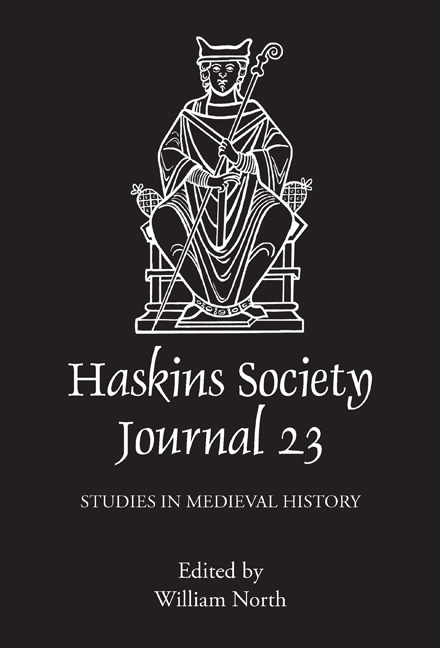Book contents
- Frontmatter
- Contents
- List of Figures
- Editor's Note
- Abbreviations
- 1 Francia and the History of Medieval Europe
- 2 Royal Control and the Disposition of Estates in Tenth-Century England: Reflections on the Charters of King Eadwig (955–959)
- 3 Denis Bethell Prize Essay: Frutolf of Michelsberg's Chronicle, the Schools of Bamberg, and the Transmission of Imperial Polemic
- 4 Manipulating Historical Memory: Cosmas on the Sees of Prague and Olomouc
- 5 Poetry and History: Baudry of Bourgueil, the Architecture of Chivalry, and the First Crusade
- Authors' Preface to Chapters 6 and 7
- 6 Men and Masculinities at the Courts of the Anglo-Norman Kings in the Ecclesiastical History of Orderic Vitalis
- 7 Men and Masculinities in William of Malmesbury's presentation of the Anglo-Norman Court
- 8 The Personnel of Comital Administration in Greater Anjou, 1129–1151
- 9 The Murder of Gilbert the Forester
- 10 The Object as Subject in Medieval Art
5 - Poetry and History: Baudry of Bourgueil, the Architecture of Chivalry, and the First Crusade
Published online by Cambridge University Press: 05 November 2014
- Frontmatter
- Contents
- List of Figures
- Editor's Note
- Abbreviations
- 1 Francia and the History of Medieval Europe
- 2 Royal Control and the Disposition of Estates in Tenth-Century England: Reflections on the Charters of King Eadwig (955–959)
- 3 Denis Bethell Prize Essay: Frutolf of Michelsberg's Chronicle, the Schools of Bamberg, and the Transmission of Imperial Polemic
- 4 Manipulating Historical Memory: Cosmas on the Sees of Prague and Olomouc
- 5 Poetry and History: Baudry of Bourgueil, the Architecture of Chivalry, and the First Crusade
- Authors' Preface to Chapters 6 and 7
- 6 Men and Masculinities at the Courts of the Anglo-Norman Kings in the Ecclesiastical History of Orderic Vitalis
- 7 Men and Masculinities in William of Malmesbury's presentation of the Anglo-Norman Court
- 8 The Personnel of Comital Administration in Greater Anjou, 1129–1151
- 9 The Murder of Gilbert the Forester
- 10 The Object as Subject in Medieval Art
Summary
Crusade and chivalry, despite their obvious historical and cultural resonances, have not always sat easily with one another. Particularly when applied to the twelfth century, both of these terms are subject to certain conceptual incompatibilities and linguistic vagaries. As Christopher Tyerman has taught us to appreciate, the word ‘crusade’, and perhaps the concept, did not exist until near the end of the twelfth century. At that point, crusading and crusaders finally became institutionalized, due to the intellectual legwork of Innocent III and the canon lawyers who defined his papal curia. Chivalry, too, in the twelfth century was a doctrine in the process of development. No definition had been fixed, nor would one ever be. Divergences in recent scholarship on the subject are so pronounced that it is difficult to say when chivalry flourished, what its effects were, and to what degree it existed outside the imaginations of clerics and poets. Chronologically, the great French historian Georges Duby proclaimed the death of chivalry at the Battle of Bouvines in 1214, a moment when, according to most conventional interpretations, chivalry was just beginning. In terms of its effects, one could find compelling arguments that chivalry was either an invention of clerics imposed on knights to control their sinful activity, or else it was a product of secular culture intended only to celebrate masculine prowess.
- Type
- Chapter
- Information
- The Haskins Society Journal 232011. Studies in Medieval History, pp. 87 - 102Publisher: Boydell & BrewerPrint publication year: 2014



